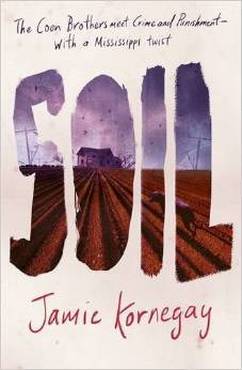
I cannot believe that I’m arguing with you about the end of the world. I cannot live this way, thinking like this. Every day that you harp on this gloom and doom is another day you miss the blessed life you have here, right now, this instant.
When Jay discovers a corpse on his flooded fields, his sanity gradually leaches away. Watched by a vengeful woodsman and the playboy deputy sheriff, Danny Shoals, Jay is heading towards an apocalypse partly of his own making.
She couldn’t imagine going back to sit with Tina and her family and wait for the reverend to pray for the damaged Messlers and Mizes. She could see herself after the service, besieged by all manner of well-wishers with their questions and blessings and guilt-inducing blather. They weren’t bad people, they just wanted her to be happy and exactly like them.
Jay’s methodical disposal of the dead body reminded me of Lizzie in Season to Taste, and I admired the description of his flashbacks in relation to the trauma of his father’s suicide (p66):
He’d never truly grieved for his father, maybe because he couldn’t stop visualising the act itself – his father’s half-blown-off face, his mother’s horrible surprise, the hot tub’s roiling pink water. The shock was that it was unimaginable but that it was too imaginable. As if it had happened to him as well.
Deputy Dan is a love-to-hate creep, while Sandy’s struggles to keep her head above water in her second year of teaching arouse our deepest sympathies, as does the emotionally-inarticulate woodsman, grieving for the dog Jay has shot. Additionally, I have a particular interest in well-written novels exploring an attachment to land. All of which would have added up to a glowing review from me, had it not been for the first fifty pages.
I can imagine the author deliberating long and hard over where to begin his story – and if he didn’t, I wish he had done, because the choices he made detracted from my enjoyment of the book. The novel forefronts the main character’s decline but, quite rightly, it’s placed within the context of the events that preceded it. Apart from the prologue featuring two anonymous characters (referred to as ‘the woodsman’ and ‘the stranger’), I detected an excess of telling over showing in the early chapters, a gaping psychic distance that reduced my curiosity about a character who was already behaving rather oddly. Perhaps other readers wouldn’t be as suspicious as I was about someone adding leaves to the compost heap (in the UK, since you’re asking, these have to be composted separately as they would otherwise prevent the heap from hotting up), but would you be happy to wait until page 51 for any acknowledgement that it was strange that Jay didn’t immediately report the dead body to the police? His reasons, based on shame passed down through generations, are extremely interesting but I needed his wife, who doesn’t start walking and talking until Chapter 8, to revive my curiosity about this family.
I think openings are one of the trickiest areas for novelists. We need to attract the reader’s attention without implying promises we can’t deliver. We need to give them enough information to navigate our characters’ landscapes without bombarding them with figures and facts. We need to drop teasers to keep those pages turning without evoking a sense of frustration that we are holding too much back. We probably can’t get it right for every reader. If you’re curious about this one, don’t let the turgid start put you off an otherwise impressive debut. Thanks to Two Roads for my review copy.

- make it hilariously funny?
- ensure your prose sings with poetry?
- draw unexpected parallels with human society?
- jack up the jeopardy to tighten up the tension?
- be the star of the popular TV show, The X-Files?
Finally, still on the theme of growing your food, here’s my response to Charli Mills’ latest flash fiction challenge to write a 99-word story that shows the bully mentality countered with a different, unexpected or kind action:
“This is gonna have to go!”
For weeks they’d loitered at the fringe of my plot, smirking and scowling at each new development. I’d dismissed their comments as gentle teasing, the old-timers’ traditional defence. Yet now I was back in the playground, the wrong kind of shoes on my feet.
Where I saw innovative recycling, they saw mountains of junk. “The judges will be here on Sunday. You’ve got five days to clear this mess.”
I tapped in the number as they marched off to their regimented gardens.
“The organic allotment award? You can come on Saturday? That’s great!”
Follow this link for an earlier post of mine on allotment gardening, where you’ll also find links to three of my longer stories on this theme.
Any feedback appreciated. Do feel free to mention your own favourite farming novels in the comments box below.





















 RSS Feed
RSS Feed





















